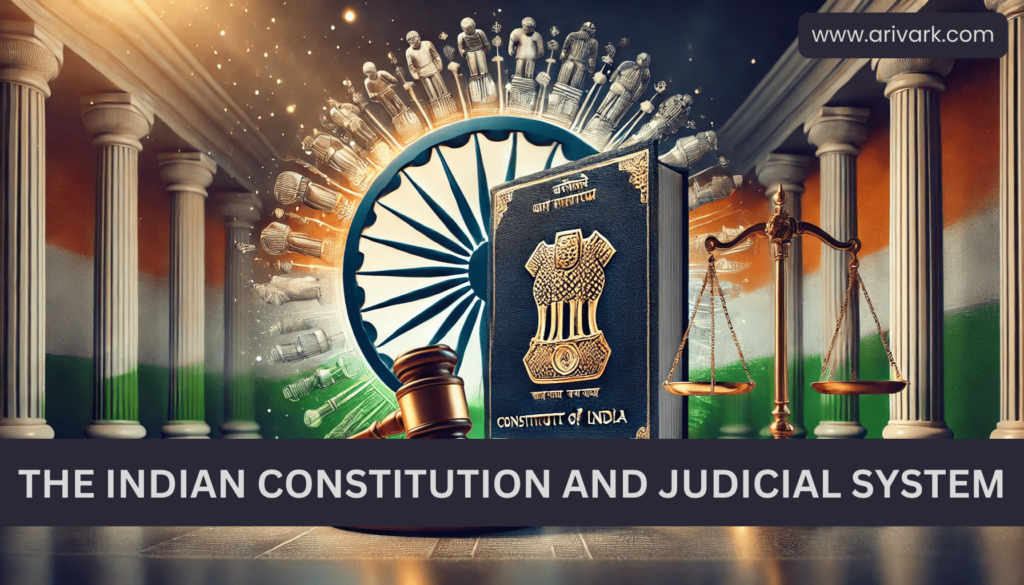The Indian Constitution and Judicial System
Constitutional Harmony and Judicial Independence
- The Indian Constitution operates in harmony with executive and legislative branches.
- Judiciary requires high-order independence to exercise democratic power effectively.
- Constitutional discipline and accountability are necessary to prevent judicial arrogance.
Balancing Judicial Accountability and Independence
- Chief Justice S.H. Kapadia emphasized the need for the government to balance judicial accountability with independence.
- Law Minister Salman Khurshid highlighted the importance of judicial propriety.
- Reconciliation of executive, legislative, and judicial functions is crucial for constitutional justice.
Constitutional Instrumentalities
- Three main instrumentalities: Executive, Legislative, and Judiciary.
- Executive: Implements state laws and policies (Cabinet led by PM/CM).
- Legislative: Parliament and State legislatures make laws.
- Judiciary: Power to correct arbitrary actions by the executive/legislature (Article 143).
- Supreme Court can issue writs to defend fundamental rights.
- Judiciary has pre-eminence but must act within the constitutional framework.
Judicial Criticism and Accountability
- Judges and courts are not immune to criticism (Felix Frankfurter’s perspective).
- Judges must be mindful of limitations and public responsibility.
- Vigorous, candid criticism is necessary to keep judicial power in check.
Judicial Appointments and Concerns
- President appoints judges based on Cabinet decisions.
- The current collegium system is criticized for a lack of transparency and accountability.
- There is a need for clear principles in the judge selection process.
- Concerns about class bias in the judiciary (Winston Churchill’s observation on British courts).
Proposed Changes to Judicial Appointments
- The government proposes replacing the collegium system with a commission.
- The commission’s composition and accountability should be publicly discussed.
- A constitutional amendment is needed for the new selection process.
Suggested Commission Structure
- A high-standing commission with status equal to the PM or Supreme Court judge.
- Chief Justice of India as the commission chairman.
- An independent investigation agency for vetting candidates.
- The commission should uphold constitutional values and be immune to legal proceedings.
- Removal only by a high tribunal of Chief Justices.
Public Participation
- Public voice is needed in the judge selection process.
- Free expression of people in the commission’s process is crucial.
இந்திய அரசியலமைப்பும் நீதித்துறை அமைப்பும்
அரசியலமைப்பு இணக்கமும் நீதித்துறை சுதந்திரமும்
- இந்திய அரசியலமைப்பு நிர்வாக மற்றும் சட்டமன்ற பிரிவுகளுடன் இணக்கமாக செயல்படுகிறது.
- ஜனநாயக அதிகாரத்தை திறம்பட செயல்படுத்த நீதித்துறைக்கு உயர்நிலை சுதந்திரம் தேவை.
- நீதித்துறை அகம்பாவத்தைத் தடுக்க அரசியலமைப்பு ஒழுக்கமும் பொறுப்புக்கூறலும் அவசியம்.
நீதித்துறை பொறுப்புக்கூறல் மற்றும் சுதந்திரத்தை சமன்படுத்துதல்
- தலைமை நீதிபதி எஸ்.எச். கபாடியா நீதித்துறை பொறுப்புக்கூறல் மற்றும் சுதந்திரத்தை அரசாங்கம் சமன்படுத்த வேண்டியதன் அவசியத்தை வலியுறுத்தினார்.
- சட்ட அமைச்சர் சல்மான் குர்ஷித் நீதித்துறை நேர்மையின் முக்கியத்துவத்தை எடுத்துரைத்தார்.
- அரசியலமைப்பு நீதிக்கு நிர்வாக, சட்டமன்ற மற்றும் நீதித்துறை செயல்பாடுகளின் சமரசம் முக்கியம்.
அரசியலமைப்பு கருவிகள்
- மூன்று முக்கிய கருவிகள்: நிர்வாகம், சட்டமன்றம் மற்றும் நீதித்துறை.
- நிர்வாகம்: மாநில சட்டங்கள் மற்றும் கொள்கைகளை செயல்படுத்துகிறது (பிரதமர்/முதலமைச்சர் தலைமையிலான அமைச்சரவை).
- சட்டமன்றம்: நாடாளுமன்றம் மற்றும் மாநில சட்டமன்றங்கள் சட்டங்களை இயற்றுகின்றன.
- நீதித்துறை: நிர்வாகம்/சட்டமன்றத்தின் தன்னிச்சையான செயல்களைத் திருத்தும் அதிகாரம் (உறுப்பு 143).
- உச்ச நீதிமன்றம் அடிப்படை உரிமைகளைப் பாதுகாக்க நீதிப்பேராணை வழங்கலாம்.
- நீதித்துறைக்கு முன்னுரிமை உண்டு, ஆனால் அரசியலமைப்பு கட்டமைப்பிற்குள் செயல்பட வேண்டும்.
நீதித்துறை விமர்சனமும் பொறுப்புக்கூறலும்
- நீதிபதிகளும் நீதிமன்றங்களும் விமர்சனத்திலிருந்து விலக்கு பெறவில்லை (ஃபெலிக்ஸ் ஃபிராங்க்ஃபர்ட்டரின் கண்ணோட்டம்).
- நீதிபதிகள் தங்கள் வரம்புகள் மற்றும் பொதுப் பொறுப்புகளை நினைவில் கொள்ள வேண்டும்.
- நீதித்துறை அதிகாரத்தைக் கட்டுப்படுத்த தீவிர, வெளிப்படையான விமர்சனம் அவசியம்.
நீதித்துறை நியமனங்கள் மற்றும் கவலைகள்
- அமைச்சரவை முடிவுகளின் அடிப்படையில் குடியரசுத் தலைவர் நீதிபதிகளை நியமிக்கிறார்.
- தற்போதைய கொலீஜியம் முறை வெளிப்படைத்தன்மை மற்றும் பொறுப்புக்கூறல் இல்லாததற்காக விமர்சிக்கப்படுகிறது.
- நீதிபதி தேர்வு செயல்முறையில் தெளிவான கொள்கைகள் தேவை.
- நீதித்துறையில் வர்க்க பாரபட்சம் குறித்த கவலைகள் (பிரிட்டிஷ் நீதிமன்றங்கள் குறித்த வின்ஸ்டன் சர்ச்சிலின் கருத்து).
நீதித்துறை நியமனங்களில் உத்தேச மாற்றங்கள்
- கொலீஜியம் முறைக்கு பதிலாக ஆணையத்தை அமைக்க அரசாங்கம் முன்மொழிகிறது.
- ஆணையத்தின் அமைப்பு மற்றும் பொறுப்புக்கூறல் பொதுமக்களிடம் விவாதிக்கப்பட வேண்டும்.
- புதிய தேர்வு முறைக்கு அரசியலமைப்பு திருத்தம் தேவை.
பரிந்துரைக்கப்பட்ட ஆணைய கட்டமைப்பு
- பிரதமர் அல்லது உச்ச நீதிமன்ற நீதிபதிக்கு இணையான அந்தஸ்து கொண்ட உயர்நிலை ஆணையம்.
- இந்திய தலைமை நீதிபதி ஆணையத்தின் தலைவராக இருக்க வேண்டும்.
- வேட்பாளர்களை ஆய்வு செய்ய சுயாதீன புலனாய்வு நிறுவனம்.
- ஆணையம் அரசியலமைப்பு மதிப்புகளைக் கடைப்பிடிக்க வேண்டும் மற்றும் சட்ட நடவடிக்கைகளிலிருந்து விலக்கு பெற வேண்டும்.
- தலைமை நீதிபதிகளின் உயர் தீர்ப்பாயத்தால் மட்டுமே நீக்கம்.
பொதுமக்கள் பங்கேற்பு
- நீதிபதி தேர்வு செயல்முறையில் பொதுமக்களின் குரல் தேவை.
- ஆணையத்தின் செயல்முறையில் மக்களின் சுதந்திரமான வெளிப்பாடு முக்கியம்.
ArivArk Academy’s Social Media Handles
Official Website: www.arivark.com
Join our Telegram Channel: https://telegram.oia.bio/ArivArk
Youtube channel: https://www.youtube.com/stayupdatedtnpsc
Instagram Account: https://www.instagram.com/sandhiyaamani/?hl=en
Download our Mobile App from Play Store ✌️
Android: http://bit.ly/tnpscexampreparation
iOS: http://bit.ly/tnpsciosapp (Organization code: ZVHPT)
Laptop/PC: https://courses.arivark.com (Organization code: ZVHPT)
TNPSC Group 1 Mains Zenith Test Series 2024
Test Series Video: https://youtu.be/Zw38IjeYL4I
Schedule: https://drive.google.com/file/d/1hys_XXc7Q7qgH-IHJWTMqMUEZzUcYHNN/view?usp=drive_link
✅ Both Tamil and English Medium
✅ Detailed Where to Study
✅ Exclusive Current Affairs Material (Essay type) (Jan to Nov 2024)
✅ 21 Unit Wise Tests + Revision and Full Tests
✅ Previous Year Question Bank with Answer Key (Essay format)
✅ Decoded Syllabus PDF
✅ Possible Mains Question Bank (Based on Syllabus)
✅ Personalized Mains Feedback
✅ Starts on September 12th
For Joining, 😊Contact WhatsApp: https://wa.me/message/O5ZEBQB4G7Q6J1 (9790360921) or In Telegram @stayupdatedadmin




